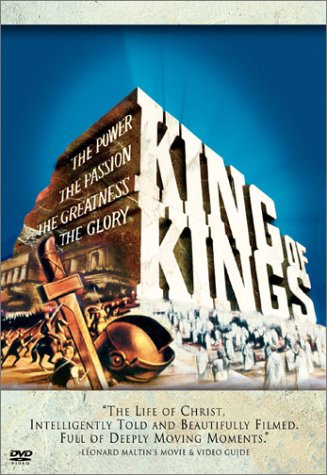
KING OF KINGS
US, 1961, 160 minutes, Colour.
Jeffrey Hunter, Frank Thring, Ron Randell, Viveca Lindfors, Hurd Hatfield, Siobhan Mc Kenna, Harry Guardino, Rip Torn, Robert Ryan, Rita Gam.
Directed by Nicholas Ray.
King of Kings is a well known biblical spectacular. It was produced by Samuel Bronston who had studios in Spain and made such spectacles as El Cid, The Fall of the Roman Empire, Fifty Five Days in Peking. The King of Kings was ridiculed at the time, especially with harsh comment on Jeffrey Hunter's performance as Christ. There was ridicule of the "clean" emphasis on Jesus even to Hunter's shaven armpits during the crucifixion. Many critics would now praise the film and say it is quiet, an intelligent and reverent view of Christ and his life.
For a religious person, the film might be too sentimental, too reverent. Hunter gives a sincere performance as do most of the other members of the cast. The film is quite spectacular and recreates the period of Jesus in an interesting fashion. It can be quickly compared with George Stevens' The Greatest Story Ever Told.
1. What were audience expectations of this film? The emphasis of the title of Christ? Indications of style from the title?
2. Why do audiences generally respond well to Biblical spectaculars? Where is their appeal? Past centuries, costume drama, the epic nature? The religious emphasis? The focus of attention on Christ and Gospel stories? How well were these expectations fulfilled here?
3. How successful a spectacle was the film? The use of wide-screen. sets and costumes. colour. music and choirs? In comparison with other Biblical spectaculars?
4. How religious was the film? In content, in treatment, in audience response?
5. How well did the film focus on Christ as central? The religious response to Christ, Christ as a religious person. as an historical person, as a character to be explored, as God and man?
6. How successful was the casting of Jeffrey Hunter as Christ? His young appearance. his clean look (Holy Card look),his strength, warmth? How real did he seem, how much a statue? His sense of mission. his relationship with his followers? With God the Father, in his achievement?
7. How well did the film take well-known incidents and film them? How enjoyable was this, how interesting, how realistic, how literal?
8. Comment on the frequent use of the shadow device for presenting Christ in action?
9. How well did the film set Christ's life in its Roman background: Pompey and the prologue Pilate and his style, Lucius and Roman rule, Roman rule and cruelty?
10. The relationship of Christ to the Romans? The effect of Christ's coming on the Romans?
11. How were these themes explored via the character of Barabbas and his relationship with Judas? The expectations of a Messiah against the Romans? Christ expected to be such a Messiah? How did this give added interest to the plot?
12. Comment on the relationship of Barabbas and Judas? Judas and his role as a loyal Jew, the expectations of Christ, what he expected from his betrayal, his disillusionment? How close to the Gospels? How interesting dramatically?
13. The presentation of Herod and his building up of a kingdom. his relationship to the Romans?
14. Herod the Great and his cruelty? The significance of his death with his son being cruel towards him?
15. Why did the film focus so much on Herod Antipas? In his relationship with Herodias. Salome. with John the Baptist, with Christ? Did the film give any insight into Herod's character and dilemmas?
16. The film's focus on Pilate?, On his wife? On her role as a Christian in the Sermon on the Mount, at the Crucifixion? The irony with the contrast of Pilate and his wife?
17. How important was the character of Lucius? As a focus of attention throughout the whole story of Christ? A Roman counterpart? The accidents of his involvement of Christ's life? At the Sermon on the Mount, at the Crucifixion, in contrast with John the Baptist?
18. Comment on the film's presentation of Christ's infancy, of Bethlehem.
19. How important was Mary in the film? Her being brought into incidents in Jesus' later life, e.g. with Mary Magdalene?
20. How strong was the characterisation of John the Baptist: his preaching, confronting of Herod, his imprisonment, the visualising of Jesus' visit to John?
21. The characterisation of the Apostles, the choice by Jesus, their capacity to be Apostles?
22. The presentation of the Pharisees and the Priests? In relationship with the Gospels? Dramatically for the plot of the film?
23. The film's presentation of such set pieces as the miracles, the Agony, the Crucifixion?
24. Comment on the film's style and its appropriateness for a Biblical spectacular.
25. What was the total impact of the film? Was it a success?